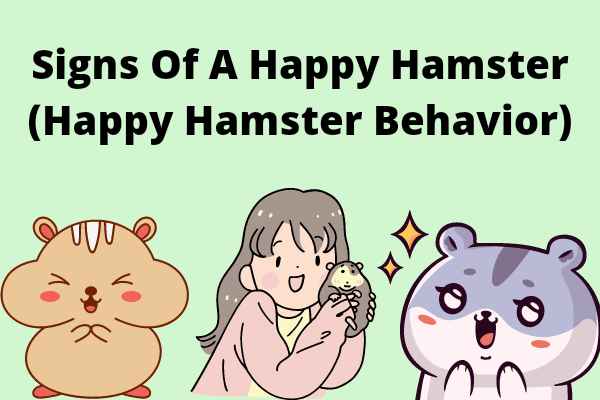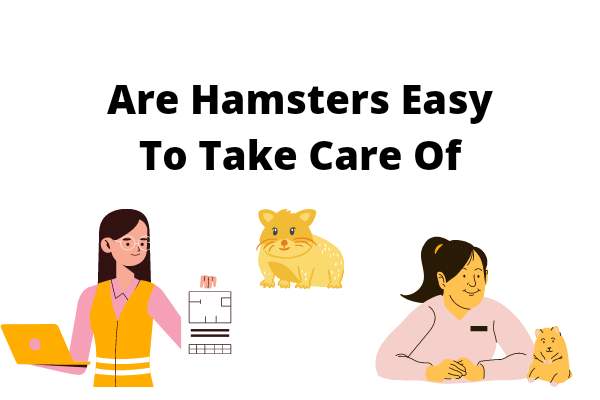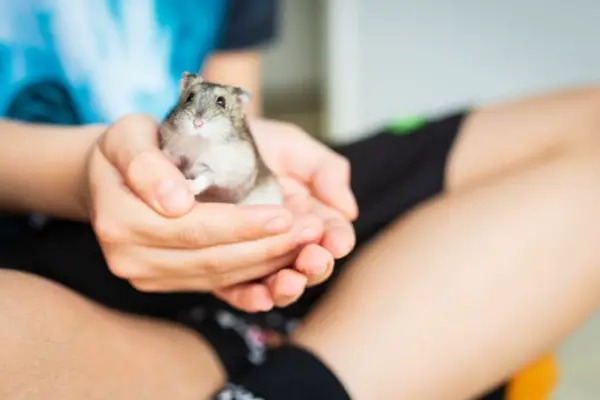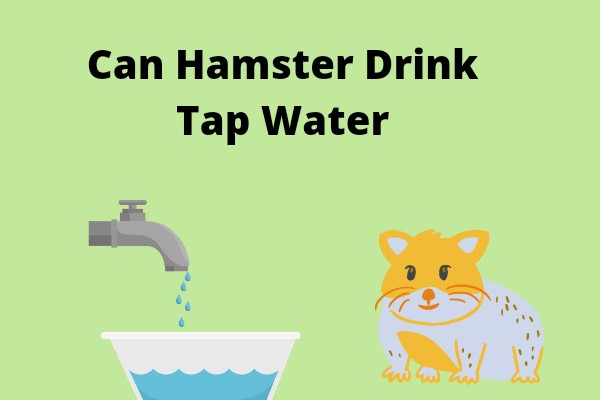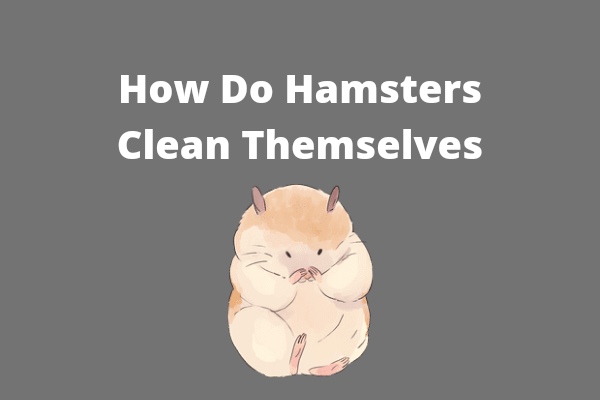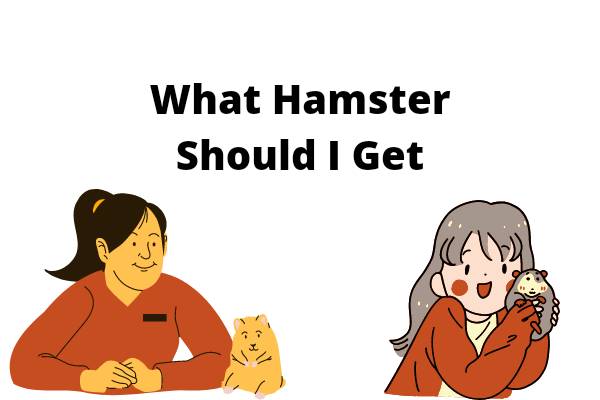Will Hamsters Eat Their Babies: 11 Reasons They Can!
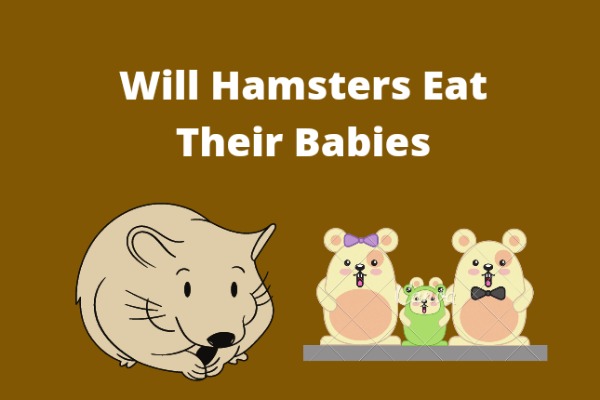
New hamster owners who want to breed hamsters always ask will hamsters eat their babies!!!
This article will break down the common reasons why hamsters eat their babies and ways to help them not eat their babies.
When hamsters are pregnant, it’s important for them to have plenty of food.
This is because, during pregnancy, they need extra nutrients that will give their babies the energy they need when they are born.
They should also get more time on the wheel to exercise.
Some people may think that hamsters eat their babies after they are born because the mother hasn’t had the opportunity to store up enough nutrients.
But, while this might happen in captivity, it is not common in nature.
Will Hamsters Eat Their Babies
Hamsters will eat their babies because of fear, stress, depression, lack of space in their cage which leads to congestion in their cage as well as their quest for more nutrients caused by poor diet, and they eat their babies when they feel threatened.
Hamsters usually give birth to around six or eight young in a litter. The female hamster will only nurse the first litter of young during her pregnancy cycle.
After that, she will typically cannibalize her pups if there is not enough room in the nest for them all. This is a natural instinct that can be seen in most rodents.
Find out how to care for and comfort a dying hamster.
Major reasons why hamsters eat their babies
Here are the major reasons why hamsters eat their babies in captivity and in the wild, which are as follows:
Hamsters eat their babies because of inability to care for their babies
Inability to care for all the babies is a common reason why female hamsters can eat up their babies to reduce number and stress.
If a female hamster is overwhelmed by the number of her new litter of babies, especially if it is a bigger litter.
She may decide she can’t care for all of them and devour them to reduce the number.
Even though it doesn’t appear to be a kind thing to do, the mother does it for the sake of the other babies to help them live happily.
Find out how to introduce two hamsters not to kill each other when you keep them together.
Hamsters eat their babies because of too much stress
Giving birth and feeding their babies causes a lot of stress in hamsters.
While hamsters can handle the stress of birth and feeding, they may not be able to handle the added stress that a hostile environment places on them.
Loud sounds, extreme heat, and disturbance from other animals or humans are among things that might stress hamsters.
Find out the common signs of a dying hamster.
Hamsters eat their babies due to fear
Mothers of many animals, including hamsters, instinctively seek to safeguard their offspring.
When hamsters feel terrified or afraid, they are more likely to murder and devour their own offspring.
Threats such as a frightened hamster, other pets, loud noises, and other things that are frightening to a tiny hamster can all lead it to devour its offspring.
Hamsters eat their babies due to lack of food
The most obvious cause for a hamster to eat its own offspring is a lack of food.
Pregnant or nursing animals expend more energy in their bodies than they would normally care for their offspring.
The hamster may just be hungry, or it may be afraid of not being able to provide for its young due to a shortage of food.
A healthy hamster mom should be fed nutritious food and provided a healthy hamster diet while she is pregnant.
Fresh fruits and veggies, pellet meals, and healthful snacks are examples of them.
They may be compensating for nutritional deficiencies by consuming some of their newborn offspring if they didn’t obtain enough food after giving birth.
Hamsters eat their babies due to a change in scent
Hamsters devote a significant amount of effort to cleaning and caring for their offspring.
The fragrance left on each infant aids the mother in identifying the newborns.
If the kids have a different scent, such as that of a human, the mother may become confused and not identify her own children.
Because the fragrance of the infant altered, it may then kill and eat the apparent imposter.
Therefore, a female hamster recognizes her infants by their fragrance and will identify them as her own.
Never touch a newborn infant since the scent from your hand might be transmitted to them.
If the mother detects your scent on them, she could mistake them for her own and devour them.
Hamsters eat their babies due to threats from a male hamster
Most male hamsters are less compassionate and don’t care about the babies than female hamsters.
They just worry about one thing: getting the female hamster’s attention at all costs not minding her babies.
In order to obtain the attention of their mother, a male hamster frequently disturbs the innocent infants, prompting the female hamster to hide the babies from the male hamster.
If there aren’t any appropriate hiding places nearby, the female hamster can suffocate her young by hiding them in her cheek pouch.
Find out about reasons why your hamster is not drinking water.
Hamsters eat their babies due to the lack of some nutrients
A hamster’s food may be deficient in some nutrients, causing them to eat their offspring to supplement their nutrition.
The diets that hamsters eat can have an impact on their personalities.
When hamsters eat diets that are deficient in Vitamin B3, they devour their own young.
Grain-fed hamsters, for example, will eat their own offspring because grains lack lots of vitamins hamsters need to stay healthy.
Hamsters eat their babies to reduce the level of care
If a mother hamster believes she won’t be able to give adequate care and attention for her entire litter, she will sacrifice part of her offspring.
She may realize that she can’t manage a brood of a particular size, since she views herself as entirely responsible for the entire litter.
She’ll reduce the herd until she’s left with a smaller litter for which she can properly care.
Hamsters eat their babies while trying to protect them from threat
When a female hamster feels frightened or afraid of her environment, she may be trying to save her offspring.
It’s possible that there’s a cat nearby, or that there’s a lot of noise or something else that’s activating their danger sensors.
If this is the case, they may eat the entire litter in most cases. She may act in this way if she feels her children are being exploited.
Find out 7 common reasons why your hamster is drinking so much water.
Hamsters eat their babies due to animal cannibalism
Animal instincts regulate hamsters, which are also seen in other species.
If a hamster believes that one of their children is a threat to them or the rest of the family, they will either murder it or abandon it.
This ensures that they, as well as the rest of the family, live and feed on the deceased family member.
There is no specific technique to deal with the element that causes hamsters to murder and devour their offspring.
Hamsters eat their babies to create space in their cage
Lack of space or little cages can also make the mother hamster anxious and compel her to eat her babies.
When a hamster thinks that there isn’t enough room for her family, she may choose to eat one of her babies in order to feed the others.
Make sure there is adequate room for the kids as well as the mother.
Making adjustments to the cage, such as adding tubes and new chambers for the pups, can enhance the cage space.
Find out more about why your hamster is not sleeping at night, 9 common reasons.
How to prevent hamsters from eating their babies
Here are some tips to help you stop your hamster from eating its babies:
Provide quiet environment for the hamster
Keep things calm and quiet by providing a peaceful setting.
Make sure your hamster has a peaceful and quiet environment to nest and raise its babies.
Children and other pets should be kept out of the room where your hamster is kept.
To avoid disturbing your hamster, keep the volume low in your home.
Cover the cage to prevent it from seeing any perceived threats or stress.
Remove other hamsters or pets around the cage
Separate the mother hamster and her babies from the rest of the hamsters or pets.
When a mother and her puppies are housed alongside other hamsters, it can lead to a lot of problems.
Since a result, there is a lot of opportunity for tension, agitation, and conflict, as the mother may feel threatened, which might lead to these behaviors.
Keep children away from the hamster cage
Early on, keep little children away from the female hamster and her offspring. If you have children, the charming cage additions will most likely make them very happy.
However, your children should not be left alone with the newborn hamsters at any point.
Your kids can wait until the newborn hamsters have developed hair and are able to move about independently before allowing them to touch them.
Provide the hamster with a complete food
Make sure your hamster has plenty of food while it is caring for its young.
This may seem obvious, but make sure your hamster has plenty of food while it is caring for its young.
Ascertain that Mom is having a well-balanced diet.
She needs to replenish her own body after feeding an entire litter.
If anything in her body is missing, it might lead to undesirable behaviors.
Ensure that a proper balance of pellets, fruits, vegetables, and freshwater is always accessible.
Do not touch the newborn hamsters
Make sure the infants are safe but don’t touch them.
For at least the first week of their existence, you should leave them alone as much as possible.
If at all possible, avoid touching the newborns with your bare hands and moving them at all.
Wait till the mother has finished weaning before handling the infants.
If you touch the infants before the mother agrees, you risk her rejecting her children.
You should wait until the infants are at least 3-4 weeks old before interfering.
Find out what type of hamster you should get that will suit you.
Wrapping up on will hamsters eat their babies
Hamsters are small rodents that are typically found in the Middle East, but they can also be found all over the world.
They’re cute animals that can be fun to watch and play with, but many people have questions about them.
Will hamsters eat their babies? There is some debate over this question.
But what we do know is that hamsters will not eat their babies if they are raised together, food and space are provided.
However, if they are raised separately, it’s hard to know for sure what might happen.
Some hamster moms may decide to protect their babies by eating them or others may decide to take care of them instead of eating them.

